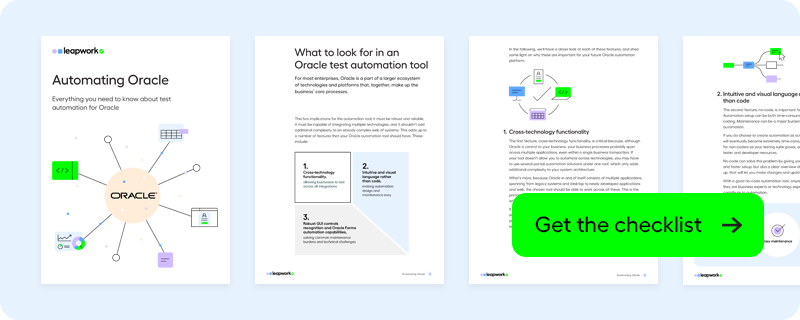Oracle Robotic Process Automation (RPA): An Introduction
Robotic process automation (RPA) can be used for Oracle to speed up processes and lower risk and costs. Learn how and see examples of use cases for Oracle process automation in this blog post.
There are numerous processes in Oracle that can be automated with RPA - so many that it’s close to impossible to list them all here. But most of these processes have one thing in common; they involve data migration in some shape or form.
While some data-related tasks are rather complex and require human intelligence, creativity and critical thinking, others are prone to error when performed by humans. These are often also the most repetitive, tedious, and boring tasks, which means most people are more than happy to let robots perform them.
RPA is not about replacing humans with robots, but rather about letting people focus on strategic tasks that require human touch, and letting robots do the rest. It is the introduction of this mindset to operations that drives higher productivity, lower costs and reduced risk.
Examples of where RPA can be used with Oracle are:
- Customer service and support
- Finance
- HR
1. Customer service and support
From the first time a customer enters a website to the point where they’ve made their purchases and perhaps need support, RPA can help enhance customer experience.
Automating service and support is not about replacing human interaction with robots (which often leads to miscommunication and frustration), but about eliminating the highly repetitive tasks that drive little-to-no value for the customer. For example, by utilizing automated data migration, support personnel can gain quick insight into customer profiles, making it possible to respond to customer queries quicker, more accurately and in a more personal manner.
Particularly in the current market situation, where many businesses have experienced an intense influx in support tickets and customer queries, an optimized model for support that is built around automation can be pivotal.
Read: How Automation can be Used to Enhance Customer Support
2. Finance
Budgeting, income and expense tracking, and reporting are just a few examples of tasks in Finance that involve many repetitive processes entailing data, typically from excel.
RPA can not only help ensure that data is moved between excel and finance and accounting systems in Oracle, it can also ensure that data is synchronized across platforms outside Oracle, and that teams always have the most updated data at hand.
This also gives real-time understanding about performance and can increase the quality of reporting on financial results.
3. HR
Human resources is more about personal interaction than it is about mundane computer work. For this reason, HR can benefit immensely from introducing RPA as a resource to eliminate repetitive tasks such as scanning through applications, updating employee information in systems, managing onboarding, and other repetitive administrative tasks that occur in and between Oracle applications.
Customer service and support, Finance, and HR are just three areas in which RPA can have great impact on efficiency and generate real value by reallocating resources and letting humans perform high-value tasks that require their intelligence and critical thinking, while letting robots do robotic work.
When resources are reconsidered and redistributed in this manner, it becomes possible for businesses to not only lower costs and risk, but also to drive higher efficiency, job satisfaction, and better customer experience, ultimately driving competitive advantage.
Learn how Oracle test automation can be used to secure higher quality and lower risk for Oracle-driven businesses in our whitepaper: Automating Oracle.

